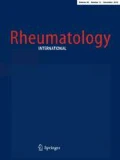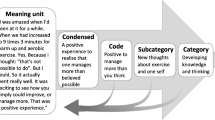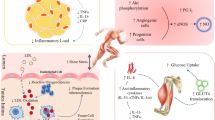Abstract
The objective of the study was to gain an insight into the perceptions and experiences of patients with rheumatoid arthritis and a high cardiovascular disease risk (CVD-RA) when undergoing an exercise intervention aimed at improving their cardiorespiratory fitness. This qualitative study was part of a pilot study, which investigated the effects of an exercise intervention on cardiorespiratory fitness in patients with CVD-RA. Six patients were invited to participate in face-to-face semi-structured interviews. We invited patients who completed the exercise intervention as well as patients who withdrew from the exercise intervention. The interviews were analyzed according to the method of thematic analysis. Six patients were interviewed, of whom four patients completed and two patients discontinued the exercise intervention. The mean (SD) age was 58 (9.7) years, the median disease duration was 10 years, and five patients were female. The analyses revealed seven themes that provided insight into perceptions and experiences: (1) ability to understand reasons for actions; (2) the need to be seen; (3) reaching their maximum effort; (4) experiencing their limits; (5) wanting personalized exercise therapy; (6) happy to be physically active; (7) benefits of exercise. Patients perceived that they were able to perform a cardiopulmonary exercise test with maximum effort and achieved the prescribed intensity of the exercise intervention. They also experienced an improvement in their physical activity by incorporating physical activity in their daily live. Overarching principles that re-occurred in the themes were: the need to be viewed as a person and the importance of feeling safe.
Similar content being viewed by others
Data availability
The data that support the findings of this study are available on request from the corresponding author (j.vd.hoek@reade.nl).
References
Agca R, Heslinga SC, Rollefstad S, Heslinga M, McInnes IB, Peters MJ et al (2017) EULAR recommendations for cardiovascular risk disease management in patients with rheumatoid arthritis and other forms of inflammatory joint disorders: update 2015/2016. Ann Rheum Dis 76:17–28. https://doi.org/10.1136/annrheumdis-2016-209775
Metsios GS, Stavropoulos-Kalinoglou A, Veldhuijzen van Zanten JCS, Nightingale P, Sandoo A, Dimitroulas T et al (2014) Individualised exercise improves endothelial function in patients with rheumatoid arthritis. Ann Rheum Dis 73:748–751. https://doi.org/10.1136/annrheumdis-2013-203291
Imboden MT, Harber MP, Whaley MH, Finch WH, Bishop DL, Fleeor BS et al (2019) The association between the change in directly measured cardiorespiratory fitness across time an d mortality risk. Prog Cardiovasc Dis 62:157–162. https://doi.org/10.1016/j.pcad.2018.12.003
Garber CE, Blissmer B, Deschenes MR, Franklin BA, Lamonte MJ, Lee I et al (2011) American College of Sports Medicine position stand. Quantity and quality of exercise for developing and maintaining cardiorespiratory, musculoskeletal, and neuromotor fitness in apparently health adults: guidance for prescribing exercise. Med Sci Sports Exerc 43:1334–1359. https://doi.org/10.1249/mss.0b013e318213fefb
Swain DP (2005) Moderate or vigorous intensity exercise: which is better for improving aerobic fitness? Prev Cardiol 8:55–58. https://doi.org/10.1111/j.1520-037x.2005.02791.x
Riebe D, Franklin BA, Thompson PD, Ewing Garber C, Whitfield GP, Magal M et al (2015) Updating ACSM’s recommendations for exercise preparticipation health screening. Med Sci Sports Exerc 27:2473–2479. https://doi.org/10.1249/mss.0000000000000664
Sobejana M, van den Hoek J, Metsios GS, Kitas GD, Jorstad HT, van der Leeden M et al (2022) Exercise intervention on cardiorespiratory fitness in rheumatoid arthritis patients with high cardiovascular disease risk: a single-arm pilot study. Clin Rheumatol 41:3725–3734. https://doi.org/10.1007/s10067-022-06343-4
Kelly A, Tymms K, Fallon K, Sumpton D, Tugwell P, Tunnicliffe D et al (2021) Qualitative research in rheumatology: an overview of methods and contributions to practice and policy. J Rheumatol 48:6–15. https://doi.org/10.3899/jrheum.191368
Aletaha D, Neogi T, Silman AJ, Funovits J, Felson DT, Bingham CO et al (2010) 2010 Rheumatoid arthritis classification criteria: an American College of Rheumatology/European League Against Rheumatism collaborative initiative. Arthritis Rheum 62:2569–2581. https://doi.org/10.1002/art.27584
Conroy RM, Pyörälä K, Fitzgerald AP, Sans S, Menotti A, De Backer G, SCORE Project Group (2003) Estimation of ten-year risk of fatal cardiovascular disease in Europe: the SCORE project. Eur Heart J 24:987–1003. https://doi.org/10.1016/s0195-668x(03)00114-3
Braun V, Clarke V (2006) Using thematic analysis in psychology. Qual Res Psychol 3:77–101
Braun V, Clarke V (2014) What can “thematic analysis” offer health and wellbeing researchers. Int J Qual Stud Health Well-being 9:26152. https://doi.org/10.3402/qhw.v9.26152
Braun V, Clarke V (2021) To saturate or not to saturate? Questioning data saturation as a useful concept for thematic analysis and sample-size rationales. Qual Res Sport Exerc Health 2:201–216
Van Nes F, Abma T, Jonsson H, Deeg D (2010) Language differences in qualitative research: is meaning lost in translation? Eur J Ageing 7:313–316. https://doi.org/10.1007/s10433-010-0168-y
Légaré F, Stacey D, Gagnon S, Dunn S, Pluye P, Frosch D et al (2010) Validating a conceptual model for an inter-professional approach to shared decision-making: a mixed methods study. J Eval Clin Pract 17:554–564. https://doi.org/10.1111/j.1365-2753.2010.01515.x
Légaré F, Stacey D, Pouliot S, Gauvin FP, Desroches S, Kryworuchko J (2011) Interprofessionalism and shared decision-making in primary care: a stepwise approach towards a new model. J Interprofessional Care 25:18–25. https://doi.org/10.3109/13561820.2010.490502
Lange E, Kucharski D, Svedlund S, Svensson K, Bertholds G, Gjertsson I et al (2019) Effects of aerobic and resistance exercise in older adults with rheumatoid arthritis: a randomized controlled trial. Arthritis Care Res (Hoboken) 71:61–70. https://doi.org/10.1002/acr.23589
Lange E, Palstam A, Gjertsson I, Mannerkorpi K (2019) Aspects of exercise with person-centred guidance influencing the transition to independent exercise: a qualitative interview study among older adults with rheumatoid arthritis. Eur Rev Aging Phys Act 16:4. https://doi.org/10.1186/s11556-019-0211-8
Hakkinen A, Sokka T, Kotaniemi A, Hannonen P (2001) A randomized tow-year study of the effects of dynamic strength training on muscle strength, disease activity, functional capacity an dbone mineral density in early rbeynmatoid arthritis. Arthritis Rheum 44:515–522. https://doi.org/10.1002/1529-0131(200103)44:3%3c515::AID-ANR98%3e3.0.CO;2-5
De Rooij M, Van der Leeden M, Cheung J, van der Esch M, Häkkinen A, Haverkamp D et al (2017) Efficacy of tailored exercise therapy on physical functioning in patients with knee osteoarthritis and comorbidity: a randomized controlled trial. Arthritis Care Res (Hoboken) 69:807–816. https://doi.org/10.1002/acr.23013
Sobejana M, van den Hoek J, Metsios GS, Kitas GD, Jorstad HT, van der Leeden M et al (2021) Cardiorespiratory fitness and physical activity in people who have rheumatoid arthritis at an increased risk of cardiovascular disease: a cross-sectional study. Rheumatol Int 41:2177–2183. https://doi.org/10.1007/s00296-021-04903-6
Barton JL, Décary S (2020) New galaxies in the universe of shared decision making and rheumatoid arthritis. Curr Opin Rheumatol 32:273–278. https://doi.org/10.1097/BOR.0000000000000699
Fraenkel L, Bathon JM, England BR, St Clair EW, Arayssi T, Carandang K et al (2021) 2021 American College of Rheumatology Guideline for the Treatment of Rheumatoid Arthritis. Arthritis Care Res (Hoboken) 73:924–939. https://doi.org/10.1002/acr.24596
Smolen JS, Landewé RBM, Bergstra SA, Kerschbaumer A, Sepriano A, Aletaha D et al (2023) EULAR recommendations for the management of rheumatoid arthritis with synthetic and biological disease-modifying antirheumatic drugs: 2022 update. Ann Rheum Dis 82:3–18. https://doi.org/10.1136/ard-2022-223356
Author information
Authors and Affiliations
Corresponding author
Ethics declarations
Conflict of interest
J. van den Hoek, M. Sobejana, F. van Nes, G. Metsios, G. Kitas, M. van der Leeden, M. Nurmohamed and M. van der Esch declare that they have no conflict of interest.
Additional information
Publisher's Note
Springer Nature remains neutral with regard to jurisdictional claims in published maps and institutional affiliations.
Rights and permissions
Springer Nature or its licensor (e.g. a society or other partner) holds exclusive rights to this article under a publishing agreement with the author(s) or other rightsholder(s); author self-archiving of the accepted manuscript version of this article is solely governed by the terms of such publishing agreement and applicable law.
About this article
Cite this article
van den Hoek, J., Sobejana, M., van Nes, F. et al. Patient perspective on exercise intervention in rheumatoid arthritis with high risk of cardiovascular disease: a pilot qualitative study. Rheumatol Int 43, 1369–1376 (2023). https://doi.org/10.1007/s00296-023-05312-7
Received:
Accepted:
Published:
Issue Date:
DOI: https://doi.org/10.1007/s00296-023-05312-7




